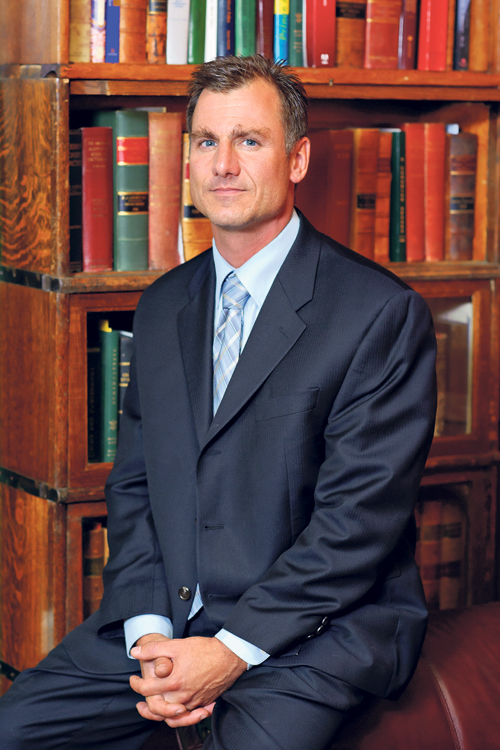A Prince Albert lawyer will serve a two-month suspension for professional misconduct, but his fine should be reduced, the Court of Appeal has ruled.
Peter A. Abrametz (not to be confused with Peter V. Abrametz, his father), had his suspension upheld in a decision released on May 23.
The decision was written by the Honourable Madam Justice Schwann, with Honourable Chief Justice Richards and Honourable Mr. Justice Herauf concurring.
Abrametz had appealed to have his suspension reduced to a reprimand. He also argued the amount charged to him by the Law Society of Saskatchewan, which oversees the legal profession and disciplines its members as appropriate, was unreasonable.
Abrametz had been found guilty of professional misconduct after getting involved in the purchase of an acreage from two of his clients. The clients, identified in court documents only as Mr. and Mrs. M., were separated and not on speaking terms. They were also friends of Abrametz. They were trying to sell an acreage in the R.M. of Paddockwood as soon as possible.
After advising the sellers that the asking price was too low, Abrametz arranged for a friend to buy it for a higher price, later coming in on the deal himself. He did not properly disclose to the sellers that he, their lawyer, was buying the property using a numbered company.
He also didn’t advise them to seek independent legal advice.
Later, Abrametz and his friend sold the property. Each took home $17,000.
A hearing into the conflict of interest was held on February 19, 2016. A decision was released on March 2, 2017.
Abrametz, who had earlier sought a judicial review into what he perceived as bias against him (that review was dismissed), sought to resurrect “bias and “procedural fairness” issues in his notice of appeal. He later abandoned those grounds of appeal, sticking to an appeal into the two-month suspension and the award of costs.
Abrametz argued that the suspension was disproportionate, especially in regards to other disciplinary decisions. He also argued the “discipline committee failed to consider and give effect to the absence of any finding of ‘dishonesty’ by the hearing committee and also failed to give effect to the hearing committee’s finding that he had been ‘well intended’ and ‘trying to help his friends.’”
According to the written decision of the appeals court, the sentencing committee considered many aggravating factors, including the three victims (the vendors who lost equity and the original purchaser), what Abrametz ought to have known, his awareness that he and his friend were in a good position to benefit and that ““the member has not accepted responsibility for his behaviour, but throughout the disciplinary process has attempted to cast aspersions against Law Society staff and blame others for his own actions.”
They mentioned a lack of prior discipline and Abrametz’s professed “lack of knowledge his conduct was wrongful” as mitigating factors.
They also cited other, similar cases, including one where a lawyer, under similar circumstances, was suspended for two years.
Given the work the disciplinary committee did, and the fact that a range of sentences is available for conflict of interest, the appeals court found the two-month suspension was “not unreasonable and well within the range of acceptable outcomes.” It was upheld.
Where the appeals court did find fault with the disciplinary decision was with the money Abrametz was ordered to pay. He was charged the entirety of the fees billed by the Law Society’s lawyer, who investigated and laid the charges, even though one of the four was dismissed.
“It was a victory of sorts (for Abrametz)… and the costs award imposed by the (committee) should have reflected this mixed result: ‘Courts have concluded that it is unreasonable to order that the member pay the entirety of the costs if not all of the charges have been proved’,” the Appeals Court decision read. The court also took issue with the fact that the Court of Queen’s Bench, back when Abrametz filed the judicial review, awarded no costs. That, the court said, should have been taken into consideration.
The committee “ignored a factor that was relevant to costs in this unique situation, failed to explain why it had no significance to its decision, and simply deferred to its broad legislative authority,” the decision read.
“The fact the Act permits recovery of all inquiry and hearing costs does not mean they must be ordered in each and every case. Costs are discretionary in nature, and should not be ordered on a full-indemnity basis by default.”
With that, the Court ordered the monetary costs charged to Abrametz be quashed, and the committee reconsider and come back with a different amount.
For his part, Abrametz provided a brief statement when reached by email.
“My only comment is that life is not fair sometimes,” he wrote.
“But I will keep fighting to make it more fair!”


